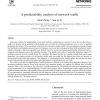Free Online Productivity Tools
i2Speak
i2Symbol
i2OCR
iTex2Img
iWeb2Print
iWeb2Shot
i2Type
iPdf2Split
iPdf2Merge
i2Bopomofo
i2Arabic
i2Style
i2Image
i2PDF
iLatex2Rtf
Sci2ools
142
click to vote
INFOCOM
2000
IEEE
2000
IEEE
A Predictability Analysis of Network Traffic
This paper assesses the predictability of network traffic by considering two metrics: (1) how far into the future a traffic rate process can be predicted with bounded error; (2) what the minimum prediction error is over a specified prediction time interval. The assessment is based on two stationary traffic models: the auto-regressive moving average and the Markov-modulated poisson process. In this paper, we do not aim to propose the best traffic (prediction) model, which is obviously a hard and arguable issue. Instead, we focus on the constrained predictability estimation with assumption and discussion about the modeling accuracy. The specific time scale or bandwidth utilization target of a predictive network control actually forms the constraint. We argue that the two models, though both short-range dependent, can capture statistics of (self-similar) traffic quite accurately for the limited time scales of interests in measurement-based traffic management. This argument, in mathematic...
Communications | INFOCOM 2000 | Traffic Predictability | Traffic Prediction | Traffic Rate Process |
Related Content
| Added | 25 Aug 2010 |
| Updated | 25 Aug 2010 |
| Type | Conference |
| Year | 2000 |
| Where | INFOCOM |
| Authors | Aimin Sang, San-qi Li |
Comments (0)

